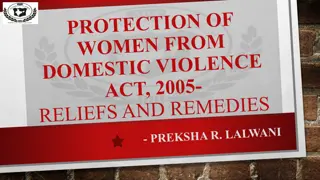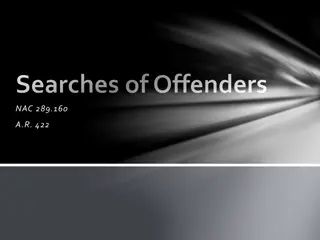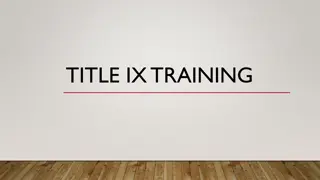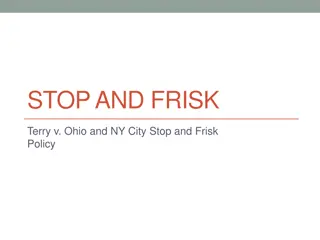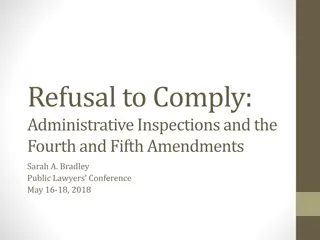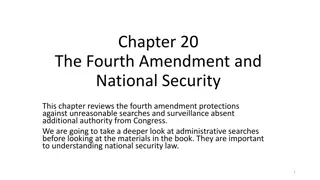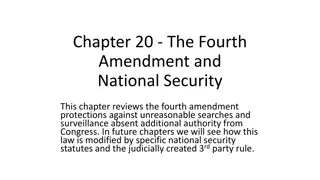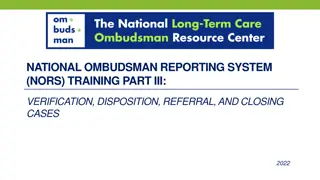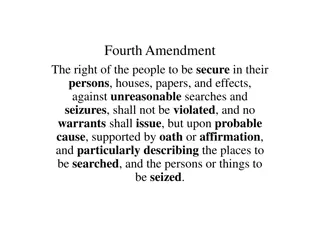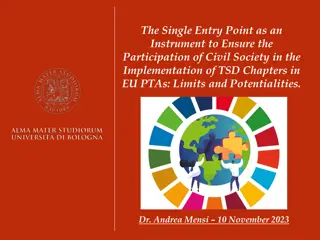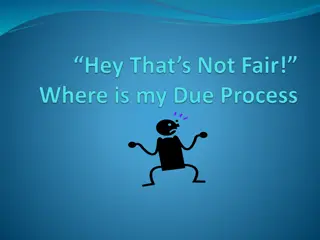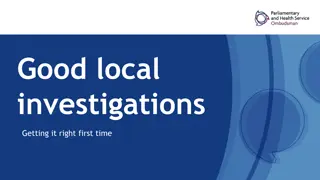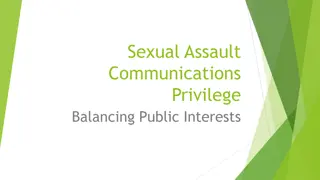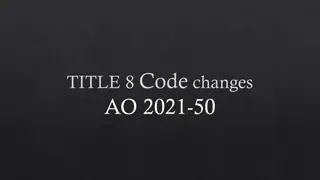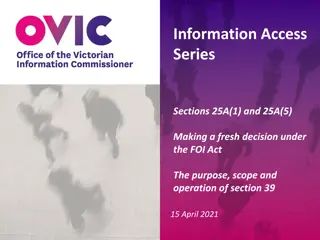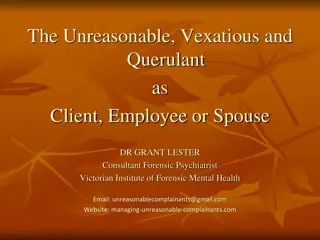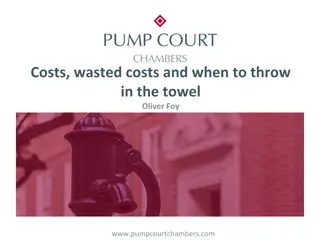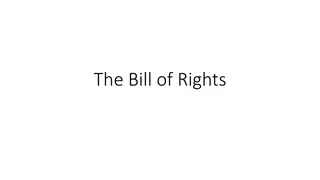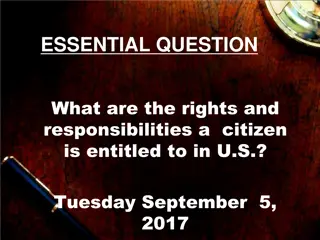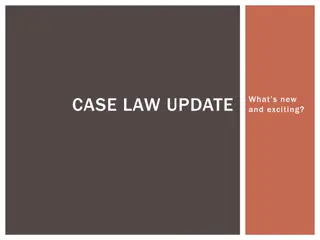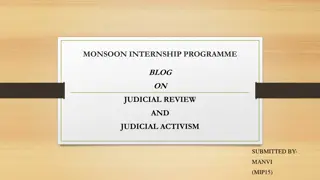Advising Complainants in Criminal Sexual Assault Cases
The essential aspects of advising complainants in criminal sexual assault cases, including their role, barriers, legal advice, and pre-trial applications. It emphasizes the importance of ethical considerations, the role of complainant's counsel, and navigating key legal procedures. The presentation
0 views • 43 slides
Illegally obtained evidence
Illegally obtained evidence refers to evidence acquired through unlawful means, such as searches without warrants or extraction under duress. The Fruit of the Poisonous Tree doctrine renders evidence inadmissible if derived from illegally obtained evidence. The Exclusionary Rule prohibits the use of
2 views • 30 slides
Managing Unreasonable Behaviour by Complainants: A Policy Overview
This policy addresses the management of unreasonable behavior by complainants within healthcare services. It outlines the purpose, exemptions, and implementation timeline of the policy, aiming to ensure respect for both service users and staff, provide guidance on managing relationships, and establi
3 views • 23 slides
Lessons in Discipleship: The Call of the First Disciples in Luke 5
In the setting of the Lake of Gennesaret (Sea of Galilee), Jesus performs a miraculous catch of fish after Peter obeys His instruction despite initial doubt. The disciples forsake all to follow Him, demonstrating deep humility and obedience even when faced with seemingly unreasonable requests. The n
0 views • 31 slides
Understanding Domestic Violence and Legal Recourse
The content provides a comprehensive overview of domestic violence, including its forms, victims, complainants, and legal provisions under the Protection of Women from Domestic Violence Act, 2005. It outlines the purpose of the act, defines domestic violence, describes its various forms such as phys
5 views • 24 slides
Guidelines for Inmate Searches and Facility Security
Inmate searches in correctional facilities are essential for safety and security. This includes procedures for clothed and unclothed body searches, contraband definition, cell search methods, and facility search reasons. The guidelines emphasize conducting searches respectfully and professionally to
3 views • 47 slides
Understanding Title IX Training and Processes
This content delves into the importance of Title IX training, outlining prohibited conducts like sexual harassment and discrimination. It explains the parties involved - complainants, respondents, and advisors. The process at colleges, investigation steps, and supportive measures are detailed, empha
0 views • 34 slides
Public Opinion on Prescription Drugs and Their Prices: Key Findings 2015-2020
Public opinion polls from 2015 to 2020, conducted by KFF Health Tracking Polls, reveal insights on Americans' views on prescription drugs. Key findings include the prevalence of prescription drug use, concerns about affordability, and challenges faced by individuals in affording their medication. Th
2 views • 20 slides
Luke's Legal Battle for Proper Care
Luke, a 41-year-old with severe disabilities, challenged the council's decision to cut his care budget by over 42%, risking his wellbeing and established carer team. His complaint led to a Judicial Review, claiming breach of Care Act duties and unreasonable decision-making. The case raises important
0 views • 29 slides
Understanding Stop and Frisk Policies: Terry v. Ohio and NY City Practices
Stop and frisk procedures, exemplified in the Terry v. Ohio case, allow law enforcement to conduct brief searches for weapons when there is reasonable suspicion of criminal activity. This concept ties back to the 4th Amendment's protection against unreasonable searches and seizures. The Supreme Cour
0 views • 13 slides
Constitutional Rights in Administrative Inspections: Refusal to Comply
This content discusses the Fourth and Fifth Amendments in the context of administrative inspections, emphasizing the protection of individuals against unreasonable searches and seizures. It covers the incorporation by the Fourteenth Amendment and key legal cases related to privacy rights and due pro
0 views • 68 slides
Understanding Fourth Amendment Protections: Balancing National Security and Privacy
This chapter delves into the Fourth Amendment protections against unreasonable searches and surveillance, emphasizing the importance of additional authority from Congress for such actions. It explores administrative searches, the cultural perceptions of searches pre and post-9/11, and the key princi
0 views • 77 slides
The Fourth Amendment: Balancing Privacy and Security
This chapter delves into how the Fourth Amendment safeguards against unreasonable searches and surveillance, exploring landmark cases like Katz v. United States. It discusses exceptions to warrant requirements, such as plain view and special circumstances searches, and special needs searches that do
1 views • 53 slides
NORS Training Part III: Verification, Disposition, Referral, and Closing Cases 2022
NORS Training Part III covers important aspects such as verification, disposition, referrals, and closing cases within the National Ombudsman Reporting System. It emphasizes the significance of confirming facts alleged by complainants, determining final resolutions, and following resident direction
0 views • 77 slides
Understanding the Fourth Amendment: Search and Seizure Laws in the United States
The Fourth Amendment of the United States Constitution protects individuals from unreasonable searches and seizures by the government. It outlines the requirements for obtaining a search warrant, defines a reasonable expectation of privacy, and details the types of searches allowed without a warrant
0 views • 18 slides
Enhancing Civil Society Participation in TSD Chapters of EU PTAs through the Single Entry Point
The Single Entry Point (SEP) serves as a key mechanism for EU-based stakeholders to address violations in Trade and Sustainable Development (TSD) commitments. Through a centralized platform, stakeholders, including EU member states, NGOs, and citizen groups, can submit complaints regarding breaches
0 views • 10 slides
Key Constitutional Amendments Explained
Explore the 4th, 5th, 6th Amendments, and the Due Process Clause of the XIV Amendment of the United States Constitution focusing on rights such as protection against unreasonable searches, double jeopardy, right to a fair trial, and due process of law.
0 views • 16 slides
Best Practices for Handling Local Investigations Efficiently
Ensuring a successful local investigation involves handling complaints in line with established principles, offering a fair process, involving complainants in decision-making, and communicating effectively. Initiating contact, evidence-based decision-making, and ensuring impartiality are key steps t
0 views • 13 slides
Understanding Sexual Assault Communications Privilege and Balancing Public Interests
Exploring the complexities and practical challenges surrounding Sexual Assault Communications Privilege (SACP), this content delves into the reasons for its establishment, the services it provides, and the implications for both defence lawyers and complainants in sexual assault trials. It sheds ligh
0 views • 19 slides
Public Opinion on Prescription Drugs and Their Prices: Insights from KFF Health Tracking Polls
Key findings from KFF Health Tracking Polls conducted between 2015-2019 reveal that a significant percentage of Americans face challenges affording prescription drugs despite the widespread use of medication. The survey highlights the impact of costs on medication adherence, showing that many indivi
0 views • 18 slides
Changes in Child Abuse Law: AO 2021-50
This document outlines significant changes in the Title 8 code relating to the abuse of children and vulnerable adults under AO 2021-50. The amendments clarify the levels of intent required for causing or permitting physical injury, decriminalize negligence in permitting child injury, and delete sec
0 views • 9 slides
Understanding Section 25A(1) and 25A(5) of the FOI Act
This content discusses the purpose, scope, and operation of Sections 25A(1) and 25A(5) under the FOI Act. It covers the processes involved in making a fresh decision, insights from the OVIC Annual Report data, challenges faced by agencies in applying Section 25A(1), and real-life case examples relat
0 views • 42 slides
Understanding Unreasonable Complainants: A Forensic Psychiatry Perspective
Explore the spectrum of complainants, from normal to unreasonable and querulant, as discussed by Dr. Grant Lester, a consultant forensic psychiatrist. Learn about the behaviors and characteristics of vexatious litigants, obsessive personalities, and those with pre-existing schizophrenia. Gain insigh
0 views • 14 slides
Understanding Costs, Wasted Costs, and When to Seek Legal Guidance
Costs in legal proceedings can be exceptional rather than routine, with specific circumstances leading to cost orders by the Tribunal. Vexatious, abusive, or unreasonable conduct can result in cost implications, including orders for wasted preparation time. Presidential guidance helps determine when
0 views • 11 slides
The Bill of Rights: Summary of Constitution Amendments
The Bill of Rights comprises the first ten amendments to the United States Constitution. These amendments guarantee various fundamental rights and protections to American citizens. Amendment I protects religious freedoms, free speech, and the right to assemble. Amendment II safeguards the right to b
0 views • 11 slides
Rights and Responsibilities of U.S. Citizens
Explore the fundamental rights and responsibilities of U.S. citizens as outlined in the Bill of Rights, focusing on key amendments such as freedom of speech, the right to bear arms, protection from quartering soldiers, and safeguards against unreasonable searches and seizures. Understand the balance
0 views • 25 slides
Recent Developments in Case Law
Explore the latest case law updates including rulings on unreasonable searches and seizures, warrantless tracking through GPS, cell phone searches, double jeopardy, and more. Dive into key legal issues and court decisions shaping law enforcement practices and individual rights.
0 views • 31 slides
Understanding Judicial Review and Judicial Activism
Judicial review provides a mechanism for judicial oversight of administrative actions, focusing on legality rather than merits. Grounds for judicial review include illegality and irrationality. Illegality involves decision-makers acting beyond their authority, while irrationality deals with decision
0 views • 14 slides




